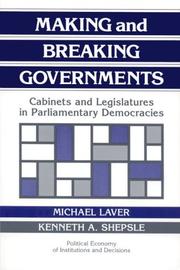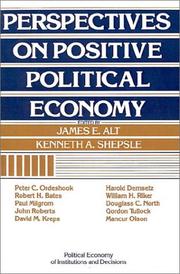| Listing 1 - 2 of 2 |
Sort by
|

ISBN: 0521438365 0521432456 0511625677 0511882076 9780521438360 9780521432450 9780511625671 Year: 1996 Publisher: Cambridge: Cambridge university press,
Abstract | Keywords | Export | Availability | Bookmark
 Loading...
Loading...Choose an application
- Reference Manager
- EndNote
- RefWorks (Direct export to RefWorks)
Making and Breaking Governments offers a theoretical argument about how parliamentary parties form governments, deriving from the political and social context of such government formation its generic sequential process. Based on their policy preferences, and their beliefs about what policies will be forthcoming from different conceivable governments, parties behave strategically in the game in which government portfolios are allocated. The authors construct a mathematical model of allocation of ministerial portfolios, formulated as a noncooperative game, and derive equilibria. They also derive a number of empirical hypotheses about outcomes of this game, which they then test with data drawn from most of the postwar European parliamentary democracies. The book concludes with a number of observations about departmentalistic tendencies and centripetal forces in parliamentary regimes.
Government --- Cabinet --- Cabinet officers. --- Cabinet system. --- Cabinet officers --- Cabinet system --- Comparative government --- Representative government and representation --- #SBIB:324H40 --- Parliamentary government --- Political representation --- Representation --- Self-government --- Constitutional history --- Constitutional law --- Political science --- Democracy --- Elections --- Republics --- Suffrage --- Comparative political systems --- Comparative politics --- Government, Comparative --- Political systems, Comparative --- Cabinet government --- Cabinet ministers --- Ministers of State --- Secretaries of State --- Public officers --- Politieke structuren: algemeen --- Comparative government. --- Representative government and representation. --- Ministres --- Institutions politiques comparées --- Gouvernement représentatif --- Social Sciences --- Political Science

ISBN: 0521392217 0521398517 0511571658 9780521398510 9780521392211 9780511571657 Year: 1990 Publisher: Cambridge: Cambridge university press,
Abstract | Keywords | Export | Availability | Bookmark
 Loading...
Loading...Choose an application
- Reference Manager
- EndNote
- RefWorks (Direct export to RefWorks)
This volume serves as an introduction to the field of positive political economy and the economic and political processes with which it is concerned. This new research tradition is distinct from both normative and historical approaches to political economy. Grounded in the rational-actor methodology of microeconomics, positive political economy is the study of rational decisions in a context of political and economic institutions. More analytical than traditional approaches, it is concerned with the derivation of principles and propositions against which real-world experience may be compared. Its focus is on empirical regularities, and its goal is theoretical explanation. The field has focused on three main areas of research: models of collective action, constraints on competitive market processes, and the analysis of transaction costs. Developments in all of these areas are covered in the book. The first part of the volume surveys the field, while the second part displays positive political economy at work, examining a variety of subjects. The final part contains essays by leading political economists on the theoretical foundations of the field.
Institutional economics --- Social choice --- Decision making --- Congresses. --- 338.22 --- Economische organisatieleer. Economisch beleid. Economische politiek --- congresses. --- 338.22 Economische organisatieleer. Economisch beleid. Economische politiek --- Congresses --- Social Sciences --- Political Science --- Institutional economics - Congresses --- Social choice - congresses. --- Decision making - Congresses
| Listing 1 - 2 of 2 |
Sort by
|

 Search
Search Feedback
Feedback About UniCat
About UniCat  Help
Help News
News